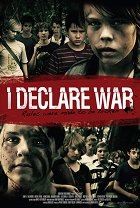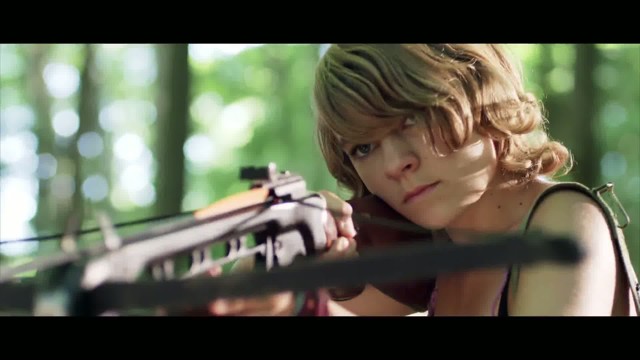Scénario:
Jason LapeyrePhotographie:
Ray DumasActeurs·trices:
Gage Munroe, Siam Yu, Mackenzie Munro, Michael Friend, Alex Cardillo, Aidan Gouveia, Alex Wall, Dyson Fyke, Spencer Howes, Andy Reid, Kolton Stewart (plus)Résumés(1)
Armed with nothing more than twigs, their imaginations and a simple set of rules, a group of 12-year-olds engaged in a lively game of Capture the Flag in the neighborhood woods start dangerously blurring the lines between make-believe and reality. Rocks = Grenades. Trees = Control towers. Sticks = Submachine guns. The youthful innocence of the game gradually takes on a different tone as the quest for victory pushes the boundaries of friendship. The would-be warriors get a searing glimpse of humanity's dark side as their combat scenario takes them beyond the rules of the game and into an adventure where fantasy combat clashes with the real world. (Drafthouse Films)
(plus)Vidéo (2)
Critiques (1)
In his review of I Declare War, Michael Reuben perfectly summarised the film thusly: “War, as General Sherman famously stated, is hell. But Sartre later remarked that hell is simply other people.” The playing at soldiers here is not an ordinary battle, because with the exception of the two stubbornly rational original commanders, all of the other participants bring their own motivations from real life into it. The central protagonist, P.K. Sullivan, is an excellent tactician because he leaves all personal levels completely aside and though that may give him an advantage in the game, it also brings severe consequences into his personal life as the iniquities of the game carry over into reality for others. I Declare War is thus a thought-provoking reflection on war as a parallel reality in relation to civilian life, while the values of these two realities are completely incompatible and contradictory. At the same time, however, it offers a complex picture of friendship in adolescence, when the ingenuous ideals of “best friends” collide with the ambiguity of reality. That is also why the only one who can come out of the game a winner is the loner Caleb, who has a real friend who never lets him down, a dog. It’s true that the themes of friendship and boys playing war have been depicted elsewhere and in greater detail, but that in no way devalues the concept and the combination of those themes in this film. Furthermore, the characters are inventively depicted through their own imaginations, specifically in how seriously they take the game, which is shown by their “materialisation” of weapons. Based on that, it is possible to identify the characters who play the game and live through it (most of the boys), those who purposefully approach it for their own ends (Jessica and Skinner), and those who stand apart from the group (Wesley and Caleb), and this diversity of characters forms the foundations of the relationships and conflicts in the film.
()


